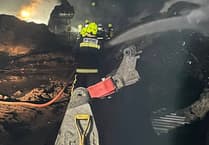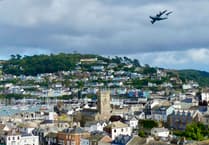Totnesians voiced objections to the conflict in Gaza at the town’s market last weekend.
Holding placards with the words “Give peace a chance”, they held a vigil and made a stand against war in the Middle East.
Organiser David Matthews said: “Two of us initially went up to the market, in favour of peace, prompted by the present terrible asymmetric conflict in Gaza, but also as a stand against all wars. Across the country, and indeed across the world, millions were gathering at the same time to express concern. Over an hour or so we distributed material and extracts from the Geneva Convention on the treatment of civilians during conflict. and people stopped to talk about what’s happening in Gaza. Many thanked us for taking a stand and being willing to bring the topic into the public forum.”
Two weeks ago, Israel started a bombing campaign and imposed a ‘total blockade’ of the Gaza Strip, blocking the entry of food, water, medicine, fuel and electricity. The campaign and blockade were a response to attacks and hostage-taking in Israel by Hamas militants.
David said during Totnes conversations on the Gaza conflict they discovered a range of views: “But chiefly horror expressed at the plight of civilians caught up in it, on both sides. With disproportionate effect, clearly, upon the people trapped within the Gaza strip, especially the children. There are no benefits from war – only destruction, and ongoing pain possibly for generations to come.
“When people asked ‘what can I do?’ we said communicate about it; peaceful protest and vigil; write to the press, MPs and use social media to discuss; and understand kindness and generosity are powerful, infectious, and do much to defray, or even prevent, conflict - on a personal level, and collectively on a national or global level.”
David and his partner, Evelyn Burges, distributed extracts from the 1950 Geneva Convention, which regulates the conduct of armed conflict and seeks to limit its effects.
He said: “It states in the Convention civilians are to be protected from murder, torture or brutality, and from discrimination on the basis of race, nationality, religion, or political opinion. Hospital and safety zones may be established for the wounded, sick and aged, children under 15, expectant mothers and mothers of children under seven.
“Also prohibited by the Convention are the taking of hostages, violence to life and person, in particular murder of all kinds, mutilation, cruel treatment and torture.”
David added: “We need to move beyond conflict to a place where we see Earth as one country. We need to see we’re living through the dying days of an old era, with attendant confusion, uncertainty, and elements of destruction as events set in motion long ago work through to a conclusion. Better times lie ahead. We need to visualise and work towards a world at peace.”




Comments
This article has no comments yet. Be the first to leave a comment.